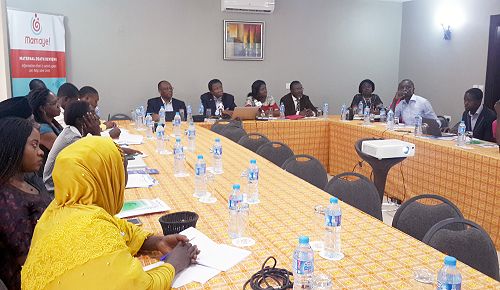Family Planning Can Prevent 18,000 Nigerian Maternal Deaths Yearly - Expert

Almost 18,000 of the 40,000 Nigerian women who die of pregnancy-related causes yearly could be saved if women who need family planning had access.
Many of the 241,000 newborn deaths would also be averted, said renowned Nigerian obstetrician and gynaecologist, Prof. Emmanuel Otolorin during the MamaYe Media Roundtable on Family Planning and Maternal Health in Abuja on 20 October 2016.
He pointed out that the survival of newborn and other young children is linked to that of their mothers, saying a study in Bangladesh in 2010 found that 23.8 per cent of children less than 10 years old who lose their mothers do not survive for long.
While pointing out that unplanned pregnancies silently drive Nigeria’s high prevalence of maternal deaths, abortions and abortion-related deaths, as well as rapid population growth rate, Prof. Otolorin argued, “if you don’t get pregnant, you cannot die of pregnancy.
“Many women don’t want or need the children they have, but they are forced to carry unplanned pregnancies and have unwanted children because they lack access to good family planning. Many abort or try to abort such pregnancies,” he said.
Each year, he said, there are 610,000 abortions in Nigeria, 60 per cent of which are unsafe and account for a substantial number of maternal deaths. Altogether, Nigeria, with 2.4 per cent of world population, accounts for 14 per cent of global maternal mortality. The maternal death ratio is 474 per 100,000 live births. However, a 2015 study by the Guttmacher Institute put the estimated number of abortions in Nigeria in 2012 at 1.25 million.
According to Prof. Otolorin, Nigeria’s already large population and uncontrolled population growth are a recipe for poverty and underdevelopment, as well as national and regional conflicts.
The nation’s fertility rate—5.5 children per woman—is the second highest in the world. With a population that is already 185 million, the nation’s population growth is on a very fast track. Unchecked, Nigeria’s human population will reach 441.7 million by 2060, making the nation the third most populous after China and India.Almost 18,000 of the 40,000 Nigerian women who die of pregnancy-related causes yearly could be saved if women who need family planning had access.
Many of the 241,000 newborn deaths would also be averted, said renowned Nigerian obstetrician and gynaecologist, Prof. Emmanuel Otolorin during the MamaYe Media Roundtable on Family Planning and Maternal Health in Abuja on 20 October 2016.
He pointed out that the survival of newborn and other young children is linked to that of their mothers, saying a study in Bangladesh in 2010 found that 23.8 per cent of children less than 10 years old who lose their mothers do not survive for long.
While pointing out that unplanned pregnancies silently drive Nigeria’s high prevalence of maternal deaths, abortions and abortion-related deaths, as well as rapid population growth rate, Prof. Otolorin argued, “if you don’t get pregnant, you cannot die of pregnancy.
“Many women don’t want or need the children they have, but they are forced to carry unplanned pregnancies and have unwanted children because they lack access to good family planning. Many abort or try to abort such pregnancies,” he said.
Each year, he said, there are 610,000 abortions in Nigeria, 60 per cent of which are unsafe and account for a substantial number of maternal deaths. Altogether, Nigeria, with 2.4 per cent of world population, accounts for 14 per cent of global maternal mortality. The maternal death ratio is 474 per 100,000 live births. However, a 2015 study by the Guttmacher Institute put the estimated number of abortions in Nigeria in 2012 at 1.25 million.
According to Prof. Otolorin, Nigeria’s already large population and uncontrolled population growth are a recipe for poverty and underdevelopment, as well as national and regional conflicts.
The nation’s fertility rate—5.5 children per woman—is the second highest in the world. With a population that is already 185 million, the nation’s population growth is on a very fast track. Unchecked, Nigeria’s human population will reach 441.7 million by 2060, making the nation the third most populous after China and India.
Read more at http://www.mamaye.org.ng/en/blog/family-planning-can-prevent-18000-niger...












